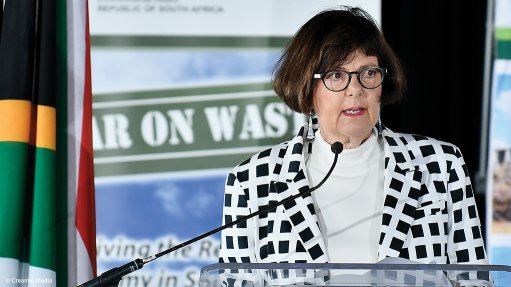South Africa’s hunting industry can play a pivotal role in assisting the country to preserve the biodiversity and ecosystem because they drive economic growth, sustainable development and human wellbeing as a whole in South Africa and the African region.
These were the sentiments expressed by the minister of Environment, Forestry and Fisheries, Miss Barbara Creecy, last week during her address of the annual general meeting of the custodians of professional hunting and conservation South Africa (CPHC-SA).
Impact of the Covid-19
She said prior to the Covid-19 pandemic the hunting industry generated R2 billion from foreign hunters and nearly eleven and a half billion rand from the domestic hunting market. Miss Creecy said the country’s biodiversity economy has been severely affected by the Covid 19 pandemic and the impact this has had on both domestic and international travel and tourism.

Biodiversity is a source of employment
She said South Africa has a rich and beautiful biological diversity ranking number three – after Brazil and Indonesia – among the top 17 mega-bio-diverse countries in the world. She added that the country’s ecosystems provide the country with services such as fresh air and water, climate regulation and water purification, adding that its bio-diversity is also a significant source of employment and economic activity.
In 2018 the National Biodiversity Assessment Report, said Miss Creecy, showed that South Africa’s has more than 418 000 people employed in biodiversity-related sectors with huge potential to grow even further in the foreseeable future. The same study estimated that the biodiversity sector contributes at least 4% to the country’s gross domestic product (GDP).
Global bio-diversity framework
But she said many ecosystems in the country and the region are facing severe degradation leading to a decline in biodiversity and the impairment of ecosystem functions and services including fresh water provisioning, climate regulation, disease control, and ecotourism. Miss Creecy said she is hoping to see the adoption of the post-2020 Global Bio-diversity Framework in May next year at Cop 15 Kuming in China. The framework presents an important opportunity, she said, to reach consensus at a global policy level on how to address biodiversity loss and through conservation and restoration efforts.
Meeting human needs
She said South Africa will support the balanced treatment of the objectives of the ‘Convention on Biodiversity’ which include conservation, sustainable use and fair and equitable benefit sharing. “Accordingly we will advance a position that promotes the protection of ecosystems, species and genetic diversity while meeting human needs and pursuing equitable benefit sharing,” said Miss Creecy.
She said the issue that is currently discussion is a proposal that by 2030 across the globe 30% of the sea and 30% of the land should be under protection and that there is an emerging consensus that this represents a global target rather than a country target.
Miss Creecy South Africa currently has 16% of our land and 5% of its sea under conservation. “Our long term protected areas expansion strategy is to increase our conservation estate by about half a percent per annum,” she said.
Registered status
Areas that are considered to be part of the protected areas estate are given a registered status if they meet certain conservation standards, explained Creecy, adding these standards go with a commitment by the owners that they will maintain those standards into the future, including effectively functioning ecosystems.
Miss Creecy said the hunting industry can play an increasing role in assisting the country to meet the 30×30 target. This is possible only if land owners sign up to conserving their estates according to the required ecological principles. Across the globe an increasing percentage of the conservation estate is in private hands. Miss Creecy added that the industry can also play a role through partnering with emerging farmers to transform the industry and support new entrants to run their businesses on sound ecological principles.
National transformation agenda
She said sustainable conservation is possible in the country if the hunting industry can help overcome the major barriers rural communities face in access and benefit sharing in the biodiversity economy. “I therefore ask your association to take the national transformation agenda into your fold and lead the charge to empower and support previously disadvantage individuals and communities to participate meaningfully in the wildlife and hunting value chains,” said Miss Creecy.
She also reflected on the high level panel report and its implications for the hunting industry. The report found that South Africa has reputation as a global leader in conservation. However, there are still reported incidents and negative perceptions about the industry including irresponsible, unethical and unsustainable conservation practices.
Destination of choice
The report observed that these perceptions do not bode well for the country’s international standing and development objectives. Miss Creecy said the panel’s recommendations are not against hunting, or building a thriving hunting industry in South Africa. “Rather, the HLP identified the need for South Africa to be re-positioned and promoted as a destination of choice for legal, regulated and responsible hunting of the five iconic species, recognising that this supports and promotes conservation and rural livelihoods.
She said her department has put out a policy position paper and is also developing an overarching policy in the form of a White Paper on ‘Conservation and Sustainable Use’ of biological and genetic resources. She said she hopes this will greatly contribute to an inclusive, transparent and transformative wildlife, industry that would guarantee a thriving future for people and nature for generations to come.







